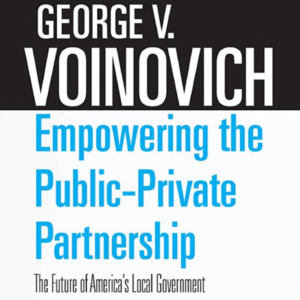By Joseph Romance
Empowering the Public-Private Partnership: The Future of America’s Local Government. By George Voinovich. Ohio University Press. 2017. ISBN: 9780821422663. 86 pages. Paperback, $19.95.
Author Note
Joseph Romance, Independent Scholar.
Correspondence regarding this book review should be addressed to Joseph Romance, Independent Scholar, 133 Whipperwill Lane, Clearville, PA 15535. E-mail: jrdocpol@gmail.com

George Voinovich (1936-2016) enjoyed a distinguished political career, serving as an Ohio state legislator, a county auditor, mayor of Cleveland, governor of Ohio, and, finally, a U.S. senator for two terms. All told, he spent 46 years in public service. In reflecting on such a public life, Voinovich chose not to write a memoir; instead, he wrote a slim volume devoted almost exclusively to his time as mayor of Cleveland (from 1980 to 1989). In Empowering the Public-Private Partnership: The Future of America’s Local Government, Voinovich offers at once an exhortation to public service and a kind of local government policy book advocating partnerships between private corporations and philanthropic foundations, and city government. As a Republican, Voinovich’s nod toward private institutions is not surprising; what is notable is his particular spirit of public service and commitment to the common good. While he does not provide a full autobiography, he gives the reader instead a distillation of that old-school belief that making public institutions work is both positive and necessary work. He hearkens back to a form of conservatism seemingly lost today and presents it in a modest and pragmatic (i.e., Midwestern) way.
The main focus of Empowering the Public-Private Partnership is Voinovich’s transformation of Cleveland during his tenure as mayor. Today, discussions of urban decay usually center on cities like Detroit; however, it is important to remember that in the 1970s, Cleveland was often held up as an exemplification of the plight of cities. At that time, Cleveland’s population was in free fall, with the city losing almost a quarter of its residents between 1970 and 1980. Roads, waterworks, and other infrastructure were crumbling, and the city could not pay its bills or repay its loans, forcing it into financial default in 1978. Enter Voinovich, who won the 1979 mayoral election on a promise to get things done. Most importantly, he wanted to bring greater efficiency and cost savings to city government. It helped that he had previous experience as a county auditor—a reminder to the reader that political experience, not just a business background, can serve as a foundation for fiscal prudence.
To achieve his campaign promise, he sought to create lasting partnerships between the private sector and city government. This objective was encapsulated in his Operations Improvement Task Force (OITF), a precursor to management systems like Total Quality Management (TQM) and, later, Lean Six Sigma. Thus, Voinovich contributed to management ideas devoted to customer satisfaction and the continuous improvement of organizations — not simply accepting the status quo. Indeed, Voinovich played a significant role in implementing continuous management improvement to public administration in Cleveland, appreciating early on that changing the climate of city government to make all the separate parts a whole was central to transforming municipal operations.
In Voinovich’s efforts to create public-private partnerships, he convinced private corporations to join with civil servants in recommending ways to make the city more efficient. Along with describing the formation of these partnerships in Cleveland, Voinovich highlights, more generally, the importance of building trust and tapping into the civic-mindedness readily available in much of the business community. He argues reasonably that “smart business owners and managers know the success of their companies is tied to their communities and to the quality of life of their workers…. Call it the principle of enlightened self-interest” (p. 30).
Voinovich’s book is notable in several ways. First, he never demonizes people. As a Republican, he makes it clear that, in his view, businesspeople were the main characters in Cleveland’s successful turnaround. However, he also speaks well, albeit briefly, of the role of unions in the city. Likewise, though he champions the world of business, he acknowledges public employees—who willingly joined in the fight to re-make the city—as an important part of the story. Second, Voinovich shares the credit for saving the city with others, including the chair of the city council and even Democrats, who disagreed with him on many issues. Indeed, these two points underscore the importance Voinovich places on giving people a voice in the system. The businesses do not simply want to just write a check; they want to ensure sure that their money is “doing good”—and that requires listening to their ideas. City employees are often stifled and are rarely asked how to improve their own departments. Voinovich writes about how applied what he learned as mayor of Cleveland to his role as Ohio’s governor, stating proudly, “For the first time, [we] gave state workers a way to speak out and to apply their ideas.” (p. 55). He also does not shy away from more controversial subjects, such as the current state of race relations and the issue of excessive force by the police; however, he does not dwell on them. Rather, he touches upon such problems to make a vital point about the basic idea of dignity: Disrespect is one of the primary ways individuals lose their dignity, and public servants must think about the dignity of all people within and served by government.
Of course, one might question Voinovich’s success: Was it really based solely on his ideas and leadership? After all, Cleveland was teetering on the brink of collapse when he took over. In such moments, leaders can draw on the willingness of others to do more than expected. Crisis can significantly bolster the notion of public service and a commitment to the public good, and when failure is not regarded as an option, people can pull together—even in politics. In the book, Voinovich refers frequently to all the hours that various private citizens or volunteers dedicated to helping, usually with little or no compensation. Again, this is enlightened self-interest at work; however, enlightened self-interest is easier to call for in desperate times. One might also raise questions about how much more willing Cleveland’s businesspeople were to give their time and money when city hall was in the hands of a fiscally conservative Republican rather than a Democrat. One wonders if a Democratic mayor had called for an increase in taxes, as Voinovich did, would they have been as successful in getting it approved? (Even with a Republican in charge, it did take Voinovich a few tries to secure his tax increases. Today, it appears that any kind of tax increase is anathema to most Republicans, at least at the national level.) Also noteworthy is the way the book slides seamlessly between making the call for the public good and also talking about “customers.” Voinovich makes little mention of the average citizen; even the word “citizen” appears infrequently. When average people do appear in the narrative, they are often referred to as workers or customers. Voinovich’s story focuses squarely on the elite and the good they can do.
Nonetheless, Cleveland achieved a reversal of ill fortune. Voinovich can claim quite reasonably to have saved the city and led the way to a new and more hopeful future. He procured loans for the city and paid them off quickly. The city’s finances improved markedly, and a series of new development projects based on the vision set out by his administration—the Rock and Roll Hall of Fame, new sports arenas, and a restored theater complex—were completed. Although Cleveland’s population continues to decline, it does so at a much slower rate than in the 1970s.
Empowering the Public-Private Partnership presents an almost old-fashioned creed—that cities are important, that the business world and the public sector are not at war, and that most people possess some kind of civic mindedness. The key to effective leadership, Voinovich suggests, may be simply awakening this public spiritedness and then harnessing it to good purpose. In that sense, Voinovich and his book are exemplars of both a seemingly lost Republican ideal and an even older republicanism that has been so essential to the health of American politics.
References
Voinovich, G. (2017). Empowering the public-private partnership: The future of America’s local government. Athens, OH: Ohio University Press.
Author Biography
 Joseph Romance has taught for over 24 years at Rutgers University, Drew University, and Fort Hays State University. Currently he is an independent scholar living in Pennsylvania.
Joseph Romance has taught for over 24 years at Rutgers University, Drew University, and Fort Hays State University. Currently he is an independent scholar living in Pennsylvania.

